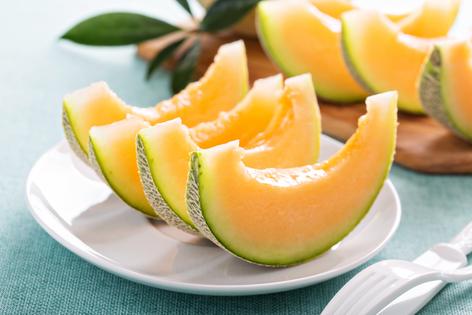4 sweet health benefits of eating cantaloupe
Published in Health & Fitness
Longer days and warmer weather are a happy indication that cantaloupe season is just around the corner. And while you can usually find this delicious melon variety in grocery stores year-round, it’ll be most delicious when in season, which can start as early as April or as late as August, depending on where you live.
Cantaloupe may not be the showiest pick in the produce aisle — it’s hard to compete when surrounded by a rainbow of options like apples, oranges and watermelons — but under its pale, rough-textured exterior lies sweet and mildly tangy orange fruit that’s as refreshing as it is nutritious. It’s also extremely versatile and a delicious addition to salads and smoothies, as well as being a perfect standalone snack, says Fareeha Jay, a United Kingdom-based registered dietitian. If you’ve ever had the pleasure of indulging in a prosciutto-wrapped slice of cantaloupe (hopefully drizzled with a hint of balsamic dressing), you know it can be a tasty component in savory dishes, too.
And for anyone with a sweet tooth who’s trying to cut down on added processed or refined sugars, cantaloupe is a healthy way to satisfy those sweet cravings. In addition to slicing up some juicy cantaloupe for a post-dinner palate cleanser, add it into smoothies for natural sweetness and dice it into salads to replace a sugary dressing.
Now that you know how easy cantaloupe is to incorporate into your diet, let’s not forget about how healthy it is for you, too. Here are the top nutritious reasons to eat more cantaloupe.
1. Cantaloupe can help keep you hydrated.
You know you have to sip water regularly throughout the day to stay properly hydrated — but don’t forget that eating fruits and veggies high in water content helps contribute to that hydration goal. “A cantaloupe is around 90% water and can be a great choice to fulfill a person’s daily hydration needs,” Jay says. “Being hydrated will keep your heart pumping and your brain functioning properly.”
2. Cantaloupe is a great source of fiber.
Fiber helps regulate digestion and keep your gut flora and blood sugar in check. Fruit is one type of food that’s notably high in fiber, and this melon is no exception. “Cantaloupe is a source of fiber, which will help you feel fuller for longer and improve your gut health,” Jay says. “It will also lower your risk of diabetes, heart disease and some cancers.”
3. Cantaloupe contains loads of vitamin C.
In case the bright color doesn’t give it away, cantaloupe is rich in vitamin C, an essential vitamin that boasts antioxidant and immunity-boosting properties. “Vitamin C will protect our cells, maintain healthy skin, blood vessels, bones and cartilage,” adds Jay. “The adult requirement for vitamin C is 65 to 90 milligrams a day. Having 3 ounces of cantaloupe will fulfill about half your daily vitamin C requirement.”
4. Cantaloupe can support eye health.
Cantaloupes’ orange color indicates that they’re a great source of beta carotene, which turns into vitamin A in the body. “It will optimize our immune system and keep our eyes and skin healthy,” Jay explains. She adds that lutein and zeaxanthin, two antioxidants found in cantaloupe that guard against free radicals, can help protect your eyes and reduce the risk of age-related macular degeneration.
(Real Simple magazine provides smart, realistic solutions to everyday challenges. Online at www.realsimple.com.)
©2022 Meredith Corporation. Distributed by Tribune Content Agency, LLC.










Comments